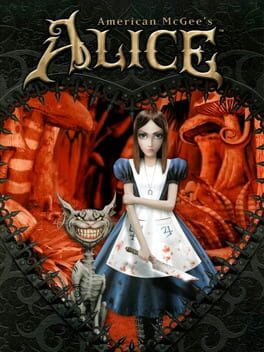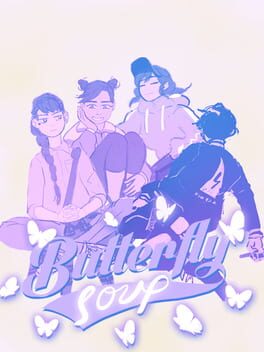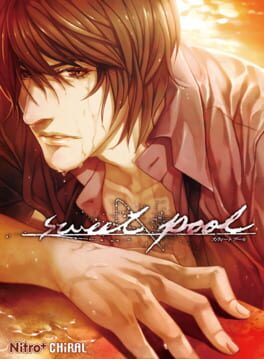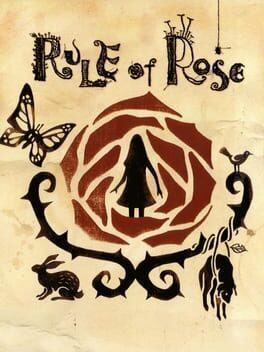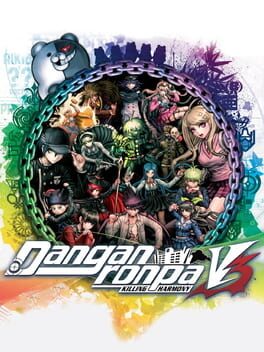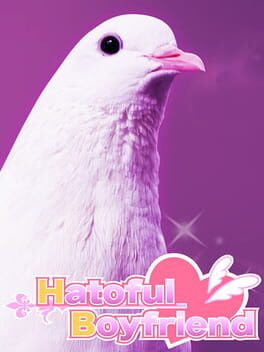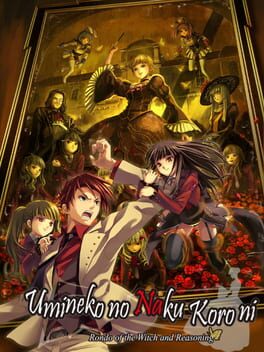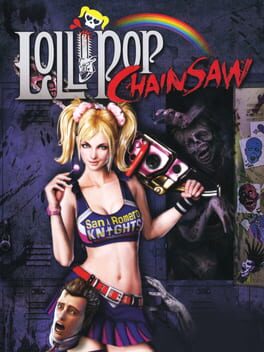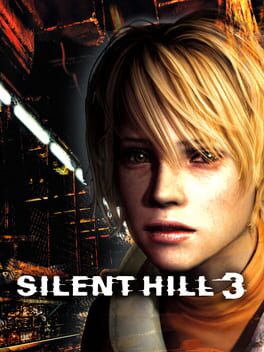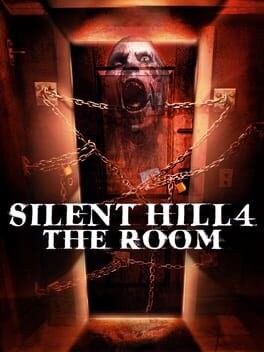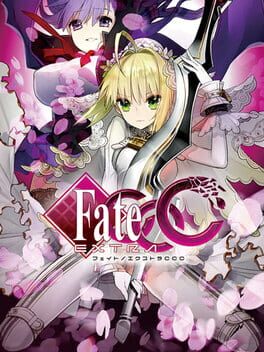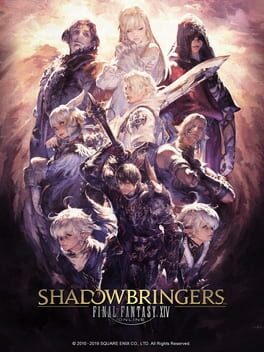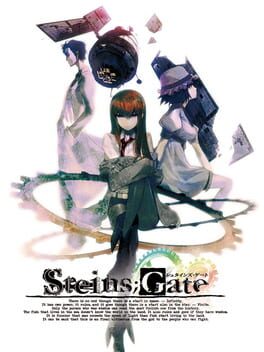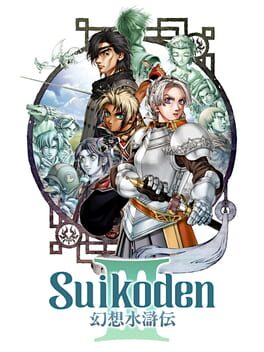viscera
118 reviews liked by viscera
weirdly the complete antithesis of what mcgee was going for in the sequel,, the sequel is bright and colorful but ultimately dour and overly dark in tone and story. this is one of the most dark looking games ive ever played and the map layouts for each level are so utterly confounding and disorienting, a labyrinthine hell constructed by others specifically for u to suffer during. the first is a game about growth and progression, forgiveness and regret and the pain that comes w both, the sequel is concerned w regression and ig I just don’t vibe w that as much. this belongs more to an era of game design like max payne or rule of rose where ur small and the world is big and there’s plenty of ppl who don’t want you to exist within it. the structure of every world is chaotic and dizzying and scary! I love some of the weirdo imagery the enemies can conjure up like the flying bomb dropping bugs that seem almost military like.
there’s so much being said here even w like v minimal actual words being said,, alice herself conveys sm through grunts and screams it’s actually kind of wild. a simple jump to a ledge sounds blood cur-tingling and filled w anger + desperation. idk to see her suffer so often and in such extreme ways and come out the other side (at least for this game) a better and more whole person is rlly fucking fulfilling and satisfying to experience.
part of me wishes there was a third game and a better ending to both alice the character and the series, but also I realize that this series obv took a lot out of mcgee and was coming from a place that’s maybe better left sitting dormant for his own mental health. he seems kind of happy as a retired old guy living in shanghai that’s left behind a wealth of art that means a lot to a lot of ppl and now just makes emo plushes that while don’t mean rlly anything to me obv mean something to enough ppl. I think that’s nice ^_^
there’s so much being said here even w like v minimal actual words being said,, alice herself conveys sm through grunts and screams it’s actually kind of wild. a simple jump to a ledge sounds blood cur-tingling and filled w anger + desperation. idk to see her suffer so often and in such extreme ways and come out the other side (at least for this game) a better and more whole person is rlly fucking fulfilling and satisfying to experience.
part of me wishes there was a third game and a better ending to both alice the character and the series, but also I realize that this series obv took a lot out of mcgee and was coming from a place that’s maybe better left sitting dormant for his own mental health. he seems kind of happy as a retired old guy living in shanghai that’s left behind a wealth of art that means a lot to a lot of ppl and now just makes emo plushes that while don’t mean rlly anything to me obv mean something to enough ppl. I think that’s nice ^_^
Butterfly Soup
2017
Cringe by way of cuteness or cuteness by way of cringe? Is the awkward storytelling routinely forced to swerve out of the spotlight to make way for banter and references incorporated as a bug or a feature? I can't tell, and it's not really my place to come to a conclusion on this matter, but I did rather enjoy the ending. Always nice to see Fremont and the East Bay in media too.
Sweet Pool
2008
This game (somewhat understandably) gets the rep of just being that weird yaoi mpreg omegaverse gore game. And I get that, because that is a large part of it, but it's also disappointing. This game has a lot more to offer than just the handful of niche kinks it appeals to.
It's a game about love, fate, religious fanaticism, devotion, gender, death, birth, chronic illness, mental illness, sacrifice, prejudice, queerness, ableism, adulthood.
It's a coming of age drama by way of Cronenberg. It shamelessly renders violence erotic and eroticism violent. It's a psychological horror and it's a heartwarming romance. Yes, it is that one game about the guy who gives birth to meat babies from his ass.
And it might be one of the most beautiful stories ever told.
It's a game about love, fate, religious fanaticism, devotion, gender, death, birth, chronic illness, mental illness, sacrifice, prejudice, queerness, ableism, adulthood.
It's a coming of age drama by way of Cronenberg. It shamelessly renders violence erotic and eroticism violent. It's a psychological horror and it's a heartwarming romance. Yes, it is that one game about the guy who gives birth to meat babies from his ass.
And it might be one of the most beautiful stories ever told.
Rule of Rose
2006
vomitingly beautiful. rule of rose is a fragmented tale for fragmented girls.
silent hill 3 might be the more important game to me (my name is heather, not jennifer), but this surpasses sh3 in so many ways. the greatest of these is the story. in 8 hours, RoR accomplishes a frankly shocking feat of accessible allegorical and abstract storytelling. i walked out of the game totally clueless as to what it was "doing" and it STILL managed resonate through its surface level alone. the gorgeous imagery and writing and music bombarding your emotions makes you want to comb through the clues and figure out what the fuck happened. then again, maybe my favorite thing is just that it's about childhood. and i mean all of childhood. sure, other games approach the topic, but none quite nail all the ways that it is frustrating, tragic, and confusing, especially as a queer girl. hell, i can't think of another game that handles childhood sexuality at all, much less with this much tact. i'll come out and say it: this is my favorite story from any game.
it would be silly of me to ignore that surface level in my little write-up, though. my thoughts can be roughly summed up as "it's perfect". when the simple act of walking around is steeped in sheer victorian misery, you know you're in for an unforgettable time. there's no "fun" to be had here. such an odd choice for a video game and yet... it works??? like so well?? nearly any praise thrown the way of pathologic's intentional unpleasantness applies here.is rule of rose pathologic for girls? you'll be unsurprised, dear reader, to know that my favorite element is the music. much ink has been splorched over the fraught and taut violins of yutaka minobe and got dammit, i am here for a resplorching. this bitch worked on the shadow the hedgehog soundtrack. she knows a thing or ten about melodrama and it shows. in the same way that i am unable to not feel happy while listening to tatsuro yamashita's ride on time, listening to this ost subjects me to a mindstate that's at best wistful and at worst utterly crushing. never has there been a mightier leitmotif than "a love suicide". i mean, the title alone... do you not get it yet?! RoR is on ANOTHER LEVEL.
if you have any love for survival horror, you owe it to yourself to play rule of rose. this kind of masterpiece shit is the reason we crate-diggers dedicate ourselves to a lifetime of the hunt. "cuz love itself is just as brief as a candle in the wind; it is pure white, just like sin".
(oh, and by the way: if you complain about the combat, yousa bitch.)
edit: i forgot to add that this is probably the scariest thing i've ever played? i real-life screamed during That One Rat Scene. insane.
silent hill 3 might be the more important game to me (my name is heather, not jennifer), but this surpasses sh3 in so many ways. the greatest of these is the story. in 8 hours, RoR accomplishes a frankly shocking feat of accessible allegorical and abstract storytelling. i walked out of the game totally clueless as to what it was "doing" and it STILL managed resonate through its surface level alone. the gorgeous imagery and writing and music bombarding your emotions makes you want to comb through the clues and figure out what the fuck happened. then again, maybe my favorite thing is just that it's about childhood. and i mean all of childhood. sure, other games approach the topic, but none quite nail all the ways that it is frustrating, tragic, and confusing, especially as a queer girl. hell, i can't think of another game that handles childhood sexuality at all, much less with this much tact. i'll come out and say it: this is my favorite story from any game.
it would be silly of me to ignore that surface level in my little write-up, though. my thoughts can be roughly summed up as "it's perfect". when the simple act of walking around is steeped in sheer victorian misery, you know you're in for an unforgettable time. there's no "fun" to be had here. such an odd choice for a video game and yet... it works??? like so well?? nearly any praise thrown the way of pathologic's intentional unpleasantness applies here.
if you have any love for survival horror, you owe it to yourself to play rule of rose. this kind of masterpiece shit is the reason we crate-diggers dedicate ourselves to a lifetime of the hunt. "cuz love itself is just as brief as a candle in the wind; it is pure white, just like sin".
(oh, and by the way: if you complain about the combat, yousa bitch.)
edit: i forgot to add that this is probably the scariest thing i've ever played? i real-life screamed during That One Rat Scene. insane.
Finally got this finished up. I started the first Danganronpa a couple years ago and basically have gotten through the next each successive year, finishing here, on the 7th anniversary of Danganronpa v3: Killing Harmony’s release. As much as I do like them, the overwhelmingly samey gameplay would’ve made them a real trial to play back-to-back-to-back so I think it was the right decision to let each breathe a bit before continuing on. I had obviously heard about v3 through osmosis and @PolaroidJack is a big fan, so I was expecting a lot. While the first half of the game is still too slow for my liking, the final act is so well done that it really catapults it beyond the other games and makes for a memorable experience. Spoilers to follow?
The cast is fantastic, even if I did call a couple of the character twists ahead of time. Kokichi, Miu, Kaede, Shuichi, Korekiyo, Kaito, all very enjoyable characters. Maybe one or two duds in here but that's not too surprising. Pretty much everyone grows or changes in interesting ways throughout the narrative but Miu and Kokichi really stole the show. Aided perhaps by the more vulgar localization, but their unhinged antics really took every scene to new heights. I might prefer Danganronpa 2: Goodbye Despair as far as a “game” thanks to its cast and the overall tone and narrative path but the actual meat of the narrative of v3 goes beyond 2 for me. I will say though, the Monokubs (this entry's mascots) are such a waste of space. I have no idea what the team was thinking with them. Is it just a gag on the audience that they’re annoying? Because they never serve any narrative role and they almost exclusively make worthless commentary. Monomi in 2 was a fantastic foil to Monokuma, so I’m confused what they were intending with the Kubs. Them aside, every moment is punctuated by the strength of this cast, as is usually the case with this series.
Trial 6 / Final Act (Spoilers)
What makes the finale so special is what it does with the twist. The twist itself isn’t too absurdly shocking - Danganronpa 1 ends with the reveal of the death game being watched and Danganronpa 2 is about a virtual world, this is the next logical step - but where the narrative goes with reflecting on this twist and what it means is what makes it effective. There's a lot of reflection on what makes a piece of fiction, how fiction affects us, and what game development can mean from a business perspective. To this end, at some point in the latter minutes of the game I did genuinely experience the unnerving feeling that the characters were real. That playing the game was looking into another world. Their lives behind the screen and mine in front of it. That's a unique feeling. The added layer of Kodaka’s reflection on how Chunsoft pushed him into this third game rings so strongly in the final chapter that it feels like Kojima on how Konami treated him - lots of questions like “what makes Danganronpa? “Who decides where the story goes?”“Should you give the fans what they want and expect or switch it up?””Can I do that without getting fired?” It's a ballsy ending that feels like it does give closure to years worth of narrative and character work. The reveals hit really hard and do things that just feel pretty unique for the medium. I can see why it might not land for some people, but it blew me away.
Criticism
My main issues are the issues I have with EACH game in the main trilogy -
• They’re too slowly paced - The overarching narrative of Danganronpa is… ineffective. I kept waiting for v3 to tie everything up, make the stuff about the despairs and THE TRAGEDY make more sense and feel less like YA fiction stuff. Obviously, the twist makes this irrelevant. While I love the twist and think it makes the game work, it does cause me to reflect on the fact that the “outside” narrative never mattered. In 1, it was just set up to the death game; in 2, it was only to make the virtual world reveal make more sense; in v3, it’s completely eschewed for the sake of the metanarrative, to its betterment. So I’m a little conflicted in that, on one hand, it does away with any need to criticize Kodaka for delaying story content in each iteration - going “Arrgghh! When will this stuff get explained?!” is pointless when, in reality, the death game was really the focus all along, and I was hyping myself for something that didn’t exist. On the other hand, I did sort of want that explanation, and getting out of it is perhaps a little cowardly - I wanted to see how the hell he could make The Tragedy make sense.
• Relevant story content for the overarching narrative is relegated to the last 2 chapters - While this is partially explained by above, I do still think it’s a negative for the structure of each game that the flow is so identical. Outside of Kaede’s role, everything in v3 is layed out early with the expectation that it won’t be explained for 15-20 hours and, yeah, that’s still the case.
•Wonky action minigames in trials that feel more like hindrance than anything - I like some of them here, and overall, this is an improvement over everything in 2. “Swords Rebuttal” in particular was massively improved now that you can actually read the dialogue before interacting with it. Debate Scrum, while very easy, is probably the best minigame in the series. Really liked it a lot. Otherwise… eh. I don’t ever feel like the minigames add much in Danganronpa. Obviously the central Debate minigame is pretty important for the game’s structure, but I don’t particularly enjoy it or the others. Outside of some truly terrible hitboxes and hit detection on firing truth bullets, the minigames are mostly pretty inoffensive in v3.
• Little interesting content in the free time + extraneous content (like the skills in v3) aren’t easily accessible in a single playthrough - While Danganronpa is on the shorter side for a VN, I still dislike the free time moments for taking away from the narrative. Additionally, they hardly ever feel truly relevant. There are definitely going to be funny moments here and there, but the strength of v3 is in the storytelling and the character interactions, the 1 on 1 date moments aren’t ever anything to write home about. The skills are a really nice addition here, but if you’re mostly just playing for the story, you only end up with a couple of them, which feels like it limits the possible gameplay elements of the trials.
• Controls are still completely asinine, I do not understand why they stayed exactly the same in the transition from a handheld to console. Menus are, overall, incompetently crafted as well. I’m glad this was mostly not the case for Rain Code.
• Fucking insane that this game is still screenshot / recording locked on PlayStation - I’m writing this review on the 7th anniversary of Danganronpa v3’s release, Spike Chunsoft. I don't think spoilers are too worrying at this point.
I just wrote up a lot of criticism, huh? Well, take that and ignore it, because it’s basically completely irrelevant to my enjoyment of the story and the game as a whole.
Presentation
Best it’s ever been. The art, the cutscenes, the music, the voice performances (I played in Japanese). Absolutely knocked it out of the park. Kokichi’s VA makes some incredible things happen in the back half and I really noticed how much work they were putting in. Takada Masafumi’s music is incredible as ever. So many standout tracks in here that really run the gamut of genre. Always a pleasure to hear his work. The art team really solidified all the designs and major elements of the world into a cohesive whole - I looked back at 1 (as well as saw it referenced ingame) and noted how off model the early CGs looked by comparison to v3’s, which just goes to show how much they had improved with them. This is not a spectacularly impressive game but the new UI elements and whatnot feel nice, and the trial UI in particular feels markedly different from prior entries, befitting the end of the series.
I'm finishing Master Detective Archives: Rain Code next and have high expectations just for it escaping the mold of Danganronpa, which only feels natural given the end of this game. Kodaka took a somewhat lopsided death game narrative and wrapped it into an extraordinarily satisfying knot, bringing together all sorts of ideas about the nature of game development, the place of fiction in society, and the very nature of existence. I know this is a controversial ending for some, but for me it was the only logical place for Danganronpa to go, and sends the series out on the biggest bang possible. The story goes on.
The cast is fantastic, even if I did call a couple of the character twists ahead of time. Kokichi, Miu, Kaede, Shuichi, Korekiyo, Kaito, all very enjoyable characters. Maybe one or two duds in here but that's not too surprising. Pretty much everyone grows or changes in interesting ways throughout the narrative but Miu and Kokichi really stole the show. Aided perhaps by the more vulgar localization, but their unhinged antics really took every scene to new heights. I might prefer Danganronpa 2: Goodbye Despair as far as a “game” thanks to its cast and the overall tone and narrative path but the actual meat of the narrative of v3 goes beyond 2 for me. I will say though, the Monokubs (this entry's mascots) are such a waste of space. I have no idea what the team was thinking with them. Is it just a gag on the audience that they’re annoying? Because they never serve any narrative role and they almost exclusively make worthless commentary. Monomi in 2 was a fantastic foil to Monokuma, so I’m confused what they were intending with the Kubs. Them aside, every moment is punctuated by the strength of this cast, as is usually the case with this series.
Trial 6 / Final Act (Spoilers)
What makes the finale so special is what it does with the twist. The twist itself isn’t too absurdly shocking - Danganronpa 1 ends with the reveal of the death game being watched and Danganronpa 2 is about a virtual world, this is the next logical step - but where the narrative goes with reflecting on this twist and what it means is what makes it effective. There's a lot of reflection on what makes a piece of fiction, how fiction affects us, and what game development can mean from a business perspective. To this end, at some point in the latter minutes of the game I did genuinely experience the unnerving feeling that the characters were real. That playing the game was looking into another world. Their lives behind the screen and mine in front of it. That's a unique feeling. The added layer of Kodaka’s reflection on how Chunsoft pushed him into this third game rings so strongly in the final chapter that it feels like Kojima on how Konami treated him - lots of questions like “what makes Danganronpa? “Who decides where the story goes?”“Should you give the fans what they want and expect or switch it up?””Can I do that without getting fired?” It's a ballsy ending that feels like it does give closure to years worth of narrative and character work. The reveals hit really hard and do things that just feel pretty unique for the medium. I can see why it might not land for some people, but it blew me away.
Criticism
My main issues are the issues I have with EACH game in the main trilogy -
• They’re too slowly paced - The overarching narrative of Danganronpa is… ineffective. I kept waiting for v3 to tie everything up, make the stuff about the despairs and THE TRAGEDY make more sense and feel less like YA fiction stuff. Obviously, the twist makes this irrelevant. While I love the twist and think it makes the game work, it does cause me to reflect on the fact that the “outside” narrative never mattered. In 1, it was just set up to the death game; in 2, it was only to make the virtual world reveal make more sense; in v3, it’s completely eschewed for the sake of the metanarrative, to its betterment. So I’m a little conflicted in that, on one hand, it does away with any need to criticize Kodaka for delaying story content in each iteration - going “Arrgghh! When will this stuff get explained?!” is pointless when, in reality, the death game was really the focus all along, and I was hyping myself for something that didn’t exist. On the other hand, I did sort of want that explanation, and getting out of it is perhaps a little cowardly - I wanted to see how the hell he could make The Tragedy make sense.
• Relevant story content for the overarching narrative is relegated to the last 2 chapters - While this is partially explained by above, I do still think it’s a negative for the structure of each game that the flow is so identical. Outside of Kaede’s role, everything in v3 is layed out early with the expectation that it won’t be explained for 15-20 hours and, yeah, that’s still the case.
•Wonky action minigames in trials that feel more like hindrance than anything - I like some of them here, and overall, this is an improvement over everything in 2. “Swords Rebuttal” in particular was massively improved now that you can actually read the dialogue before interacting with it. Debate Scrum, while very easy, is probably the best minigame in the series. Really liked it a lot. Otherwise… eh. I don’t ever feel like the minigames add much in Danganronpa. Obviously the central Debate minigame is pretty important for the game’s structure, but I don’t particularly enjoy it or the others. Outside of some truly terrible hitboxes and hit detection on firing truth bullets, the minigames are mostly pretty inoffensive in v3.
• Little interesting content in the free time + extraneous content (like the skills in v3) aren’t easily accessible in a single playthrough - While Danganronpa is on the shorter side for a VN, I still dislike the free time moments for taking away from the narrative. Additionally, they hardly ever feel truly relevant. There are definitely going to be funny moments here and there, but the strength of v3 is in the storytelling and the character interactions, the 1 on 1 date moments aren’t ever anything to write home about. The skills are a really nice addition here, but if you’re mostly just playing for the story, you only end up with a couple of them, which feels like it limits the possible gameplay elements of the trials.
• Controls are still completely asinine, I do not understand why they stayed exactly the same in the transition from a handheld to console. Menus are, overall, incompetently crafted as well. I’m glad this was mostly not the case for Rain Code.
• Fucking insane that this game is still screenshot / recording locked on PlayStation - I’m writing this review on the 7th anniversary of Danganronpa v3’s release, Spike Chunsoft. I don't think spoilers are too worrying at this point.
I just wrote up a lot of criticism, huh? Well, take that and ignore it, because it’s basically completely irrelevant to my enjoyment of the story and the game as a whole.
Presentation
Best it’s ever been. The art, the cutscenes, the music, the voice performances (I played in Japanese). Absolutely knocked it out of the park. Kokichi’s VA makes some incredible things happen in the back half and I really noticed how much work they were putting in. Takada Masafumi’s music is incredible as ever. So many standout tracks in here that really run the gamut of genre. Always a pleasure to hear his work. The art team really solidified all the designs and major elements of the world into a cohesive whole - I looked back at 1 (as well as saw it referenced ingame) and noted how off model the early CGs looked by comparison to v3’s, which just goes to show how much they had improved with them. This is not a spectacularly impressive game but the new UI elements and whatnot feel nice, and the trial UI in particular feels markedly different from prior entries, befitting the end of the series.
I'm finishing Master Detective Archives: Rain Code next and have high expectations just for it escaping the mold of Danganronpa, which only feels natural given the end of this game. Kodaka took a somewhat lopsided death game narrative and wrapped it into an extraordinarily satisfying knot, bringing together all sorts of ideas about the nature of game development, the place of fiction in society, and the very nature of existence. I know this is a controversial ending for some, but for me it was the only logical place for Danganronpa to go, and sends the series out on the biggest bang possible. The story goes on.
Metal Gear Solid
1998
A truly, astonishingly remarkable experience from beginning to end, but how did straight boys play this game in the nineteen goddamn nineties and not melt like the Wicked Witch of the West?! Perhaps the single most homoerotic work of fiction that I have ever consumed, Metal Gear Solid is the story of queer men who can only express affection and desire for one another through ostentatious displays of sensualized violence. This is my first Hideo Kojima game but it certainly won't be my last.
Super Mario Bros Wonder is a 2d mario platformer game I wanted for so long that feels like a breath of fresh air after the stagnation that was the 3DS and Wii U games. Improved animations, more enemies, better levels--most importantly creative levels as well as the classic special stage levels that aren't afraid to be challenging, cooler-looking worlds, and a fun wonder flower gimmick.
Every level is really fun to play through and made me want to see more what enemies and wonder flower gimmicks it would pull even if some get reused but shake things up a little. I'm glad Mario Maker inspired to team the try to make something that at least felt different to push the classic mario games instead of making another New Super Mario game with the same models and called it a day.
Which brings me to another topic about the animations. The animations greatly improves the quality of the game and makes everything feel alive and expressive. They really put a lot of effort into the expressions of enemies, playable characters, bosses, and everything; It really makes me appreciate this game much more.
However, I do have problems with two things in this game: the short levels and the talking flowers. I know some levels gets a slight extension when using a wonder flower (and trust me I've gotten almost every wonder seed I could find while playing the game), but levels just feel WAY too quick and get me wanting more out of the enemies and gimmicks they provided. However, some levels do achieve that balance between not too long but not too short. It feels like a personal complaint coming from me (which it kinda is tbh) but I like this a lot and wanted more out of the levels if that makes sense. Second, the talking flowers are just really annoying and makes me want to turn off their voices or switch to another language (which I did at one point) because the screaming and the "Well, that was something..." or other quips makes it little unbearable than it should to me. Still, it's fine overall.
After the New Super Mario Bros games for DS and Wii and playing the 3ds one it felt so boring and same-y but this game has topped off the others for me and maybe even Super Mario World for how creative it can be and bearing that sheer confidence with the gimmicks.
Every level is really fun to play through and made me want to see more what enemies and wonder flower gimmicks it would pull even if some get reused but shake things up a little. I'm glad Mario Maker inspired to team the try to make something that at least felt different to push the classic mario games instead of making another New Super Mario game with the same models and called it a day.
Which brings me to another topic about the animations. The animations greatly improves the quality of the game and makes everything feel alive and expressive. They really put a lot of effort into the expressions of enemies, playable characters, bosses, and everything; It really makes me appreciate this game much more.
However, I do have problems with two things in this game: the short levels and the talking flowers. I know some levels gets a slight extension when using a wonder flower (and trust me I've gotten almost every wonder seed I could find while playing the game), but levels just feel WAY too quick and get me wanting more out of the enemies and gimmicks they provided. However, some levels do achieve that balance between not too long but not too short. It feels like a personal complaint coming from me (which it kinda is tbh) but I like this a lot and wanted more out of the levels if that makes sense. Second, the talking flowers are just really annoying and makes me want to turn off their voices or switch to another language (which I did at one point) because the screaming and the "Well, that was something..." or other quips makes it little unbearable than it should to me. Still, it's fine overall.
After the New Super Mario Bros games for DS and Wii and playing the 3ds one it felt so boring and same-y but this game has topped off the others for me and maybe even Super Mario World for how creative it can be and bearing that sheer confidence with the gimmicks.
Silent Hill
1999
Still the perfect example of a litmus test for people who can't parse a story all these years later
A product made with so much love,care and understanding,that it knew full when it was time to close the book on the series. You can see it everywhere,from the immaculate presentation and soundtrack,to the extremely well thought-out cast,whose interactions are still so goddamn entertaining and most of all,heartfelt.
There's really no other way to say it: there's no other game,outside Umineko,that truly loves stories as much as this one. Sometimes,those very lies are what keep you going through all the suffering. And that's exactly what will make me float on too.
Plus,this is the second game in which Kodaka just fellates Metal Gear Solid 2 to completion. How can you not love something so unabashedly celebratory of everything that inspired it?
"The memories you have and the role you were assigned are burdens you had to carry. It doesn't matter if they were real or not,that's never the point. There's no such thing in the world as absolute reality. Most of what they call real is actually fiction. What you think you see is only as real as your brain tells you it is."
A product made with so much love,care and understanding,that it knew full when it was time to close the book on the series. You can see it everywhere,from the immaculate presentation and soundtrack,to the extremely well thought-out cast,whose interactions are still so goddamn entertaining and most of all,heartfelt.
There's really no other way to say it: there's no other game,outside Umineko,that truly loves stories as much as this one. Sometimes,those very lies are what keep you going through all the suffering. And that's exactly what will make me float on too.
Plus,this is the second game in which Kodaka just fellates Metal Gear Solid 2 to completion. How can you not love something so unabashedly celebratory of everything that inspired it?
"The memories you have and the role you were assigned are burdens you had to carry. It doesn't matter if they were real or not,that's never the point. There's no such thing in the world as absolute reality. Most of what they call real is actually fiction. What you think you see is only as real as your brain tells you it is."
Hatoful Boyfriend
2011
One of the most egregious examples I've seen of good ideas stretched out far beyond their viability. Fully completing this game takes about 10 hours (16+ if you're voice acting the game with friends), and its charm and intrigue fade far before you'll see any "true ending" that resolves overarching plotlines. This game needed drastic cuts - if it were a third of its length, it would have been a solid 7/10. But its problems extend beyond feeling like chewing on the same piece of gum for too long.
Its characters are a mix of one-note archetypes ("the snooty rich one," "the shy childhood friend") and One Joke ("the narcoleptic teacher," "the lolrandom one [athletic]," "the lolrandom one [anime]"). A few of them receive some development (contained either to their character-specific ending or the "true ending" arc) and most of which receive eleventh-hour Emotional Dramatic Twists™. It would be easier to gloss over the weak parts if they didn't stick around for so long, but many of them weren't stellar material to begin with. A couple character arcs manage to earn a drop of genuine pathos, but more try their hardest and come off as unearned and incongruous.
The central plot is similarly thin & disappointing. I had hoped that, after so much drudgery in completing all the other endings, it would redeem the game, or at least end on a strong note. Unfortunately, everything teased in bits & pieces is resolved in a final arc with a hodgepodge of revelations, ranging from "huh that's kind of interesting" to "that's it?"
There's little else to praise the game for. Aside from the fun human drawings of the cast, the art is almost entirely just stock art. Many dramatic moments fall flat because of a lack of visuals, and the prose does not step up to the plate to compensate. The soundtrack, similarly, is all free-to-use music that can't shake feeling cheap. Typos, issues loading saves, and a poorly-implemented text skip feature don't help either. Hatoful Boyfriend was ultimately a disappointment - not just because of what it did wrong, but because of how thoroughly its good ideas were mired in mediocrity.
Its characters are a mix of one-note archetypes ("the snooty rich one," "the shy childhood friend") and One Joke ("the narcoleptic teacher," "the lolrandom one [athletic]," "the lolrandom one [anime]"). A few of them receive some development (contained either to their character-specific ending or the "true ending" arc) and most of which receive eleventh-hour Emotional Dramatic Twists™. It would be easier to gloss over the weak parts if they didn't stick around for so long, but many of them weren't stellar material to begin with. A couple character arcs manage to earn a drop of genuine pathos, but more try their hardest and come off as unearned and incongruous.
The central plot is similarly thin & disappointing. I had hoped that, after so much drudgery in completing all the other endings, it would redeem the game, or at least end on a strong note. Unfortunately, everything teased in bits & pieces is resolved in a final arc with a hodgepodge of revelations, ranging from "huh that's kind of interesting" to "that's it?"
There's little else to praise the game for. Aside from the fun human drawings of the cast, the art is almost entirely just stock art. Many dramatic moments fall flat because of a lack of visuals, and the prose does not step up to the plate to compensate. The soundtrack, similarly, is all free-to-use music that can't shake feeling cheap. Typos, issues loading saves, and a poorly-implemented text skip feature don't help either. Hatoful Boyfriend was ultimately a disappointment - not just because of what it did wrong, but because of how thoroughly its good ideas were mired in mediocrity.
